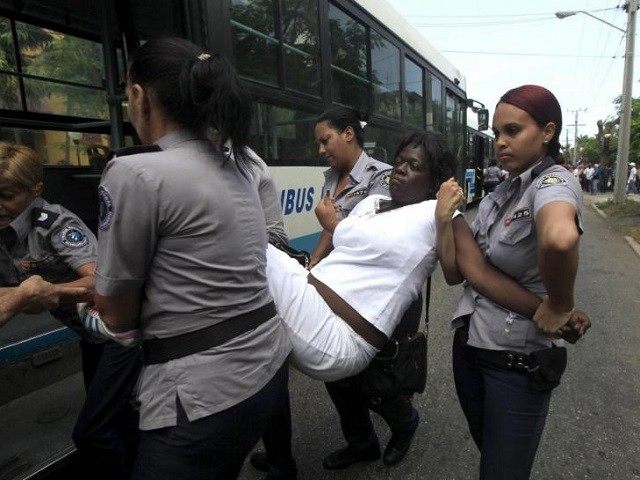The pastor of an underground Evangelical church in Camagüey, Cuba, has denounced the communist government for leveling the building in which he holds religious services as a warning to others that openly practicing Christianity on the island will result in government persecution.
On Friday morning, communist officials executed a pre-dawn raid on the church of Pastor Bernardo de Quesada Salómon – an Evangelical church known as the Apostolic Movement – arrested the pastor, and tore down the church building. While initial reports indicated that communist officials had only torn the roof off the building, Quesada himself has confirmed to the independent Cuban outlet 14 y medio that the building “does not exist; it was demolished entirely.”
14 y medio notes that the government has targeted the church since 2012, alleging a zoning violation involving the use of the premises for religious activity. In December, Camagüey’s planning board issued an order of demolition for the building, though Quezada denies that his family has violated any law by praying in the building.
“Everything that is independent or has nothing to do with the official government bothers them, they don’t like it,” Quezada told the publication after being released following his arrest. “They see us as a danger because our churches are growing the most, have the most new people coming in,” he adds, noting that he opened his church in 2013 after becoming disillusioned with the church he previously belonged to working in concert with the Castro dictatorship.
After opening his new church, he noted, government officials accused him of running “a church operated by the CIA,” an accusation Quezada vehemently denies.
The America-based Martí Noticias reports that Quezadas is one of “various home-churches run by Christian pastors demolished” in recent memory. While the Camagüey incident appears the most egregious of the year so far, Martí Noticias notes that at least one other Christian facility has been leveled in Las Tunas province and its pastor, Juan Carlos Núñez, has also been arrested.
Catholic churches in Cuba have fared slightly better than their Protestant counterparts, largely because Catholicism is one of the few religious one can practice legally in Cuba. The preservation of Catholic facilities can be in part attributed to Havana Archbishop Jaime Ortega, who has kept close ties to the Castro dictatorship despite the official state imposition of Marxist atheism as a guiding philosophy. Ortega has denied the existence of political prisoners on the island, calling dissidents “former delinquents” with “no culture.” In the Vatican, Pope Francis has made highly questionable remarks regarding prisoners of conscience on the island, as well. In July, in response to a question about the suppression of Christianity in Cuba, Pope Francis told a reporter, “There are some countries and also some European countries where you cannot make a sign of religion, for different reasons, and on other continents the same.” He also denied knowing anything about a political arrest that occurred right in front of him in Havana, as a man was violently hauled away for shouting the word “freedom” in the vicinity of the Pope.
Not all officials have taken this line within the Catholic church, however. A former official, in fact, has said that a majority of Catholic leadership in Cuba disagrees with Ortega’s approach to the dictatorship. Lenier González, former editor of a Catholic magazine, said in a recent interview that he found “a very strong resistance within the Church, in the clergy… because the Church was used to giving space to voices critical of the government.” “They would have preferred a more belligerent magazine against the government,” he added, noting that much of the Church has “a monolithic view… regarding the illegitimacy of the Revolution.”
Such dissidence within Ortega’s ranks became clear in December, when Pinar del Rio Bishop Jorge Serpa directly contradicted Ortega and condemned the practice of imprisoning political dissidents in Cuba. We do have cases of political prisoners, persons serving long sentences for whom I have requested a review on behalf of the Church, and I will not tire of doing so,” Serpa said.
This Sunday, at least 50 members of the Ladies in White were detained, some beaten violently and dragged into police vehicles by their hair. A total of 300 people in Santiago de Cuba and Havana are believed to have been arrested; those not belonging to the Ladies in White are believed to be members of the Patriotic Union of Cuba (UNPACU), another dissident group.
“It was violent and very aggressive; in other occasions they have been aggressive, but this time, they came to attack and injure,” UNPACU leader Antonio Rodiles told El Nuevo Herald.
Violent arrests have increased notably since December 2014, when President Barack Obama announced major concessions to the Castro regime. One estimate found that political arrests in Cuba increased 70 percent between January and March 2015. 1,093 arbitary political arrests occurred in October 2015 alone.

COMMENTS
Please let us know if you're having issues with commenting.